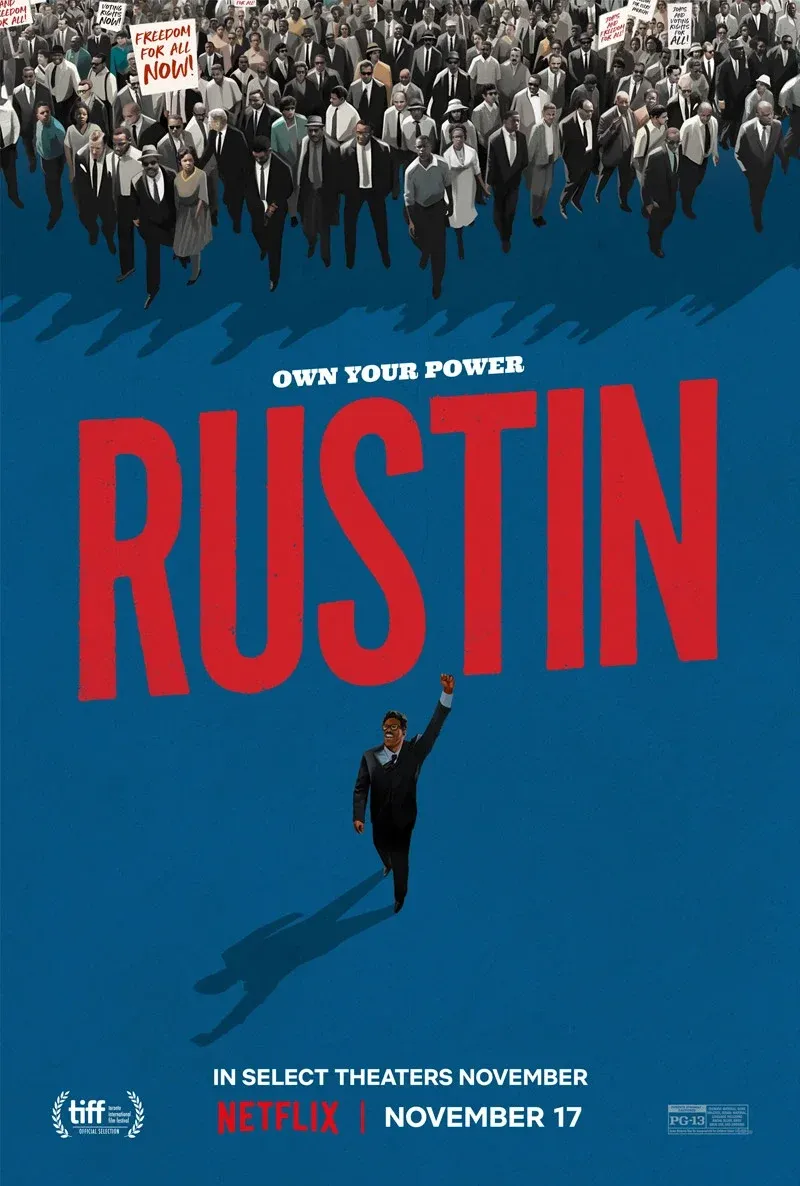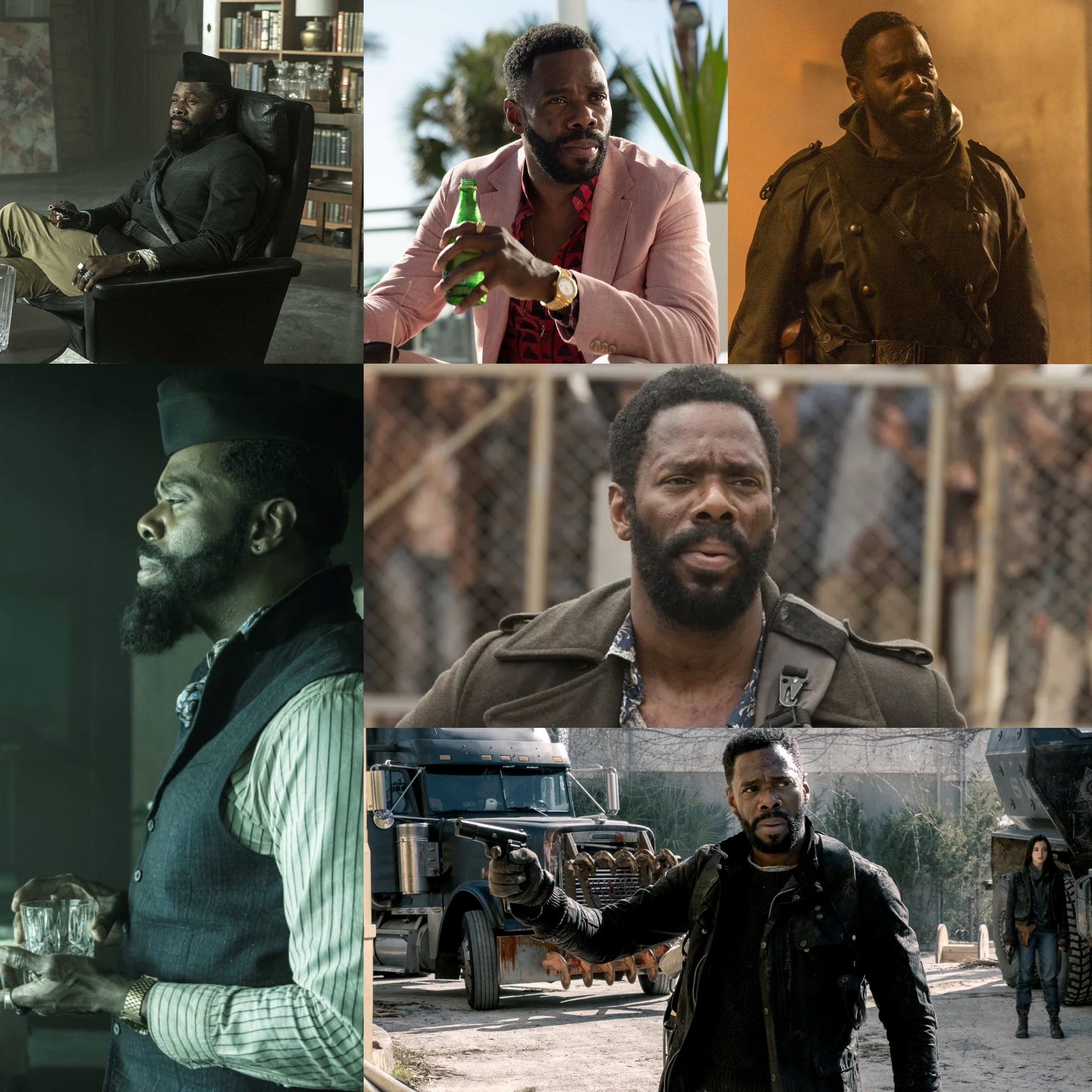Rustin
A biopic of Bayard Rustin

Bayard Rustin, civil rights activist and advisor to Martin Luther King Jr., dedicates his life to the quest for racial equality, human rights, and worldwide democracy. However, as an openly gay Black man, his efforts are often all but erased from the civil rights movement that he helped build.
The movie begins with the text…
“1954. The U.S. Supreme Court ruled segregation unconstitutional. Even so…”
Then we see a montage of dramatic re-enactments. First, there’s Elizabeth Eckford, one of the Little Rock Nine, on her way to class in 1957, surrounded by the hate-filled white faces of her schoolmates. Then, we see little Ruby Bridges in 1960, flanked by the looming figures of police, skipping her way into William Frantz Elementary School in Louisiana, and the screaming white faces that greeted that small child. Then we see Anne Moody in 1963, sitting determinedly at the Woolsworth lunch counter, covered in the food that was hurled at her by screaming white faces all around her.
The message is clear: The racism of White America never went away.
Which is certainly a timely thing to point out…
That having been said, this opening montage is also an excellent microcosm of the film’s central problem. Its message and context is important, this history is important, just like the answer to the open and vicious racism of White America that was the March on Washington is important, not to mention uplifting and inspiring—this is all shit that people should know, and be forced to see—but at the same time…
It’s all presented here in a very stale and very rote manner.
Rustin is about the difficulties that came with trying to unify fractured Civil Right movements—SNCC, the SCLC, and early followers of Malcolm X, amongst others—all in an effort to bring over a quarter of a million people to the Lincoln Memorial for the largest nonviolent protest in U.S. history. Rustin chronicles that whole fight, a fight that took place over mere weeks, while specifically focusing on one of the men most crucial to bringing this historic moment together, all amid his own personal struggles, Bayard Rustin.
Bayard Rustin not only had to stand against the hostile forces of White America arrayed against his Blackness, but he had to navigate this all while dealing with the community and societal animosity that came with him also being a gay man. The film is both an ode to the man, and the tireless grassroots activism he shepherded that is responsible for bringing this great moment together, but mostly…
This is a Colman Domingo showcase.

A spin-off of The Walking Dead, originally meant to show what happened during the initial days of that universe's zombie apocalypse, Fear The Walking Dead is a terrible show. Terrible. As a result of a mishmash of low budgets, bad writing, and a narrative direction that veers wildly between seasons, something that is obviously the result of heavy-handed over-correction by the Producers in a desperate attempt to create a hit show, instead of one that merely rides the coattails of the successful main brand, the result is pretty simple to see… it’s just an all-around subpar TV show.
I’ve watched every season.
And in every season, Coleman Domingo is a very welcome presence. Playing the somewhat shady, untrustworthy, and opportunistic conman, Victor Strand, a man who is trying to survive the end of the world, he’s the one that often keeps things lively. In Rustin, it’s the same story. While Bayard Rustin is obviously a very different character than Victor Strand, Colman’s performance is just as electric. He is the center of every shot, just full of charisma, demanding attention, a truly towering presence.
This is how it should be, as Bayard himself was man who demanded attention. A pacifist, a socialist, and a civil-rights activist, he was a fiery orator and debater, and a close friend to the Rev. Dr. Martin Luther King Jr.. A gifted performer as well, he was a singer and a lutist. Not only was he one of the March’s main organizers, he even read the March’s demands out from the podium, and stood near King as the man delivered his “I Have a Dream” speech.
He was a man of many talents, and his was a life worth knowing about.
All of the events depicted in the film are all very inspiring, not to mention very interesting from a historical viewpoint, especially as I mentioned above, Bayard Rustin is often somewhat erased from the narrative, most likely due his being both a socialist and a gay man, but does the film pull it off? Kind of. Mostly due to Colman Domingo’s performance. There’s a lot of touching and emotional moments, of course, and he can sell the hell out of them, but they also mostly tend to have too much of a feeling of a soliloquy, too much of a feeling of a history lesson. It’s all very staid and expected in its presentation. Story-wise, the film is only really saved by its more human moments, the smaller interpersonal ones, and the moments of levity.
Rustin the film obviously has a lot of admiration for Rustin the man, much like Maestro does, but also much like Maestro, when a biopic bounds across the rooftops of a notable person’s very notable life, like this one does, it often misses a lot of the important things happening down on street-level. Attempting to condense the weight of the film’s central personality (not to mention this monumental moment in history that he was heavily involved in) down to two hours just takes the whole story out at the knees. The film really struggles to do justice to his life and his struggles, splashing the story across the screen in broad strokes, nodding at some of his personal and professional hurdles, while completely fabricating others out of a hodge-podge of events that potentially may have happened to him.
Of course, this is what biopics always do, and it is also why they’re often just a mix of great moments adrift in a sea of vaguely disappointing disconnect.
But, despite its many flaws, most of which are simply the inherent flaws that always come with doing a biopic, you can’t help but be moved by the big moment, and the heroism of all of those who put it together. There’s a feeling of optimism, something that the retelling of these events always bring with them, a feeling of optimism that the film really plays up, it’s inspiring, and it really sticks with you afterwards. It’s a feeling that’s only dampened once you open your phone and look out that little window at the world outside again.
But all that aside, from the first moment that Colman Domingo is on the screen, he grabs you. It really is a great performance, towering and powerful, very sincere and very human, one that will touch you and leave you feeling emotional in the end. It is definitely worthy of the Oscar nomination it received. It’s so good, that it’s only upon later reflection that you realize, without that performance… there otherwise really isn’t all that much of a movie here to speak of.
